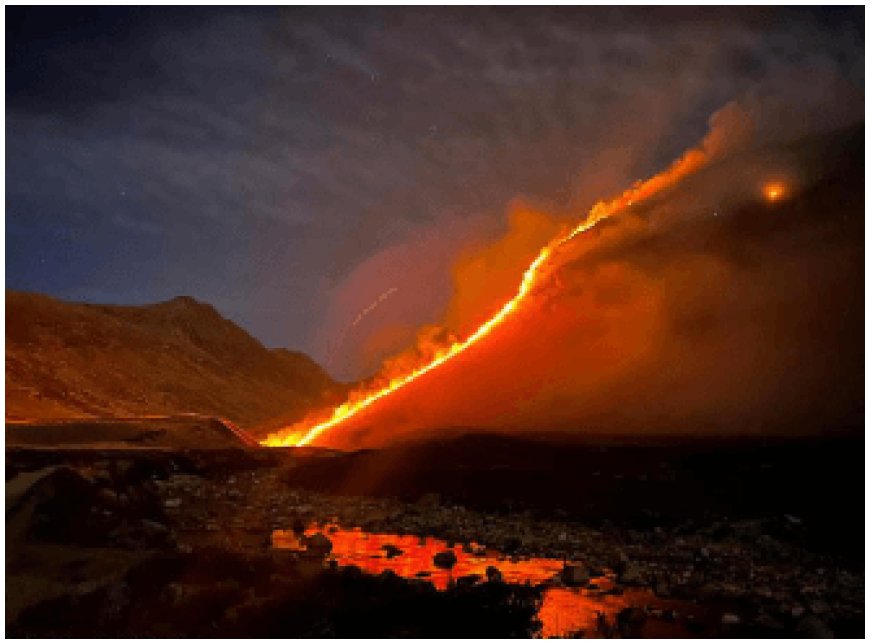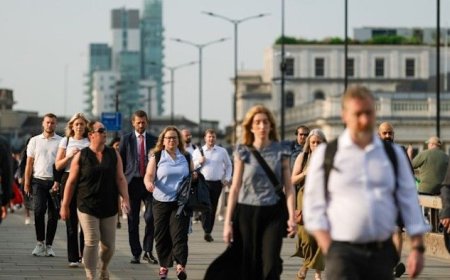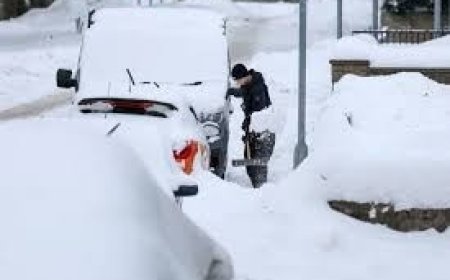UK Faces Unprecedented Wildfire Surge as Heatwave Grips Nation
UK Faces Unprecedented Wildfire Surge as Heatwave Grips Nation

The United Kingdom is experiencing an unprecedented wave of wildfires, with 2025 marking the highest recorded area of land affected since official records began in 2012. More than 439 wildfires have been reported across the country so far this year, a sharp increase driven by unusually high temperatures and prolonged dry spells.
The ongoing heatwave has caused temperatures to soar to 29°C in London—well above average for this time of year—raising alarm among emergency services and climate experts alike.
This surge in wildfires is a stark reminder of the growing impact of climate change in regions historically unaccustomed to such extremes. The warm, dry weather has created ideal conditions for fires to ignite and spread rapidly, particularly in rural and grassy areas where vegetation has been dried out by weeks of minimal rainfall. Many of the fires have erupted in southern England, but northern regions, including parts of Scotland and Wales, have also seen an uptick in incidents, signaling a nationwide crisis.
Fire services across the UK have been placed on high alert, issuing public warnings urging citizens to avoid open flames and refrain from activities that could spark fires, such as barbecues or the careless disposal of cigarettes. In some counties, fire brigades have declared major incidents due to the volume and scale of wildfires. Firefighters, already stretched thin by the frequency and intensity of recent outbreaks, are battling blazes under extreme conditions that test both their endurance and available resources.
The London Fire Brigade, among the busiest in the country, has responded to numerous calls in and around the capital as the city experiences abnormally high temperatures. Parks, heathlands, and green spaces that typically serve as public havens during warm weather are now at risk, prompting temporary closures in some areas. Officials warn that the situation could worsen if the heatwave persists, especially given forecasts of continued high temperatures and little rain.
Beyond immediate safety concerns, these wildfires pose serious long-term risks to the environment. Fires destroy vital ecosystems, kill wildlife, and release large quantities of carbon dioxide into the atmosphere, further exacerbating the climate crisis. Peatlands—one of the UK’s most important carbon sinks—are particularly vulnerable, and once ignited, they can smolder underground for weeks or even months, making them difficult to extinguish and increasing the ecological toll.
Climate scientists have long warned that the UK, though not typically associated with wildfire activity, is not immune to the global trend of intensifying extreme weather events. Recent years have seen a steady rise in the number and severity of wildfires, often tied to prolonged periods of heat and drought. This year’s record-breaking figures suggest that wildfires may become a regular feature of the British summer, challenging existing emergency infrastructure and environmental policy.
Government officials have acknowledged the growing threat and called for urgent measures to adapt the UK’s fire response systems to a changing climate. Proposals under discussion include increased funding for fire services, more comprehensive land management strategies, and public education campaigns about fire safety. There is also a push for local authorities to implement stricter rules on controlled burns and open flame use during high-risk periods.
Environmental advocacy groups have seized on the current crisis to urge stronger climate action. They argue that the surge in wildfires is symptomatic of a broader failure to address the root causes of climate change, such as greenhouse gas emissions and deforestation. They also point to the need for better land use planning and the restoration of natural firebreaks, like wetlands and wooded buffer zones, that can slow the spread of flames.
Public response to the wildfires has been a mix of concern and solidarity. Local communities have organized support networks for those displaced by fires or affected by smoke inhalation, while volunteers have stepped in to aid exhausted fire crews. Social media is awash with images and videos of scorched landscapes and fire-blackened skies, sparking wider awareness and calls for accountability.
The health implications of the fires are another growing concern. In addition to the direct risks posed by flames, smoke from wildfires can worsen air quality significantly, leading to respiratory problems, especially in vulnerable populations such as children, the elderly, and those with preexisting conditions like asthma. Hospitals in affected regions have reported an uptick in admissions for smoke-related illnesses, and public health advisories have been issued across several districts.
Looking ahead, meteorological experts warn that the heatwave may continue for another week, potentially pushing temperatures into the low 30s°C. Such conditions are likely to keep fire risk at critical levels. The Met Office has issued red warnings for extreme heat in multiple regions, and local councils are working to coordinate emergency responses, including the provision of cooling centers and evacuation plans where necessary.
The situation has drawn international attention, with climate researchers from across Europe observing the UK’s fire data as part of a broader study on the changing patterns of wildfires in temperate zones. The UK’s experience is increasingly mirrored in parts of Germany, the Netherlands, and Scandinavia, where heatwaves are becoming more frequent and intense.
As the country grapples with this growing crisis, experts agree on one thing: wildfires are no longer a remote or rare phenomenon in the UK. The record-breaking numbers this year reflect a shifting climate reality that demands urgent, coordinated action across all levels of government and society. Whether through better prevention, improved emergency response, or comprehensive climate mitigation strategies, the UK must adapt quickly to safeguard its people, landscapes, and future.
What's Your Reaction?
 Like
0
Like
0
 Dislike
0
Dislike
0
 Love
0
Love
0
 Funny
0
Funny
0
 Angry
0
Angry
0
 Sad
0
Sad
0
 Wow
0
Wow
0













































